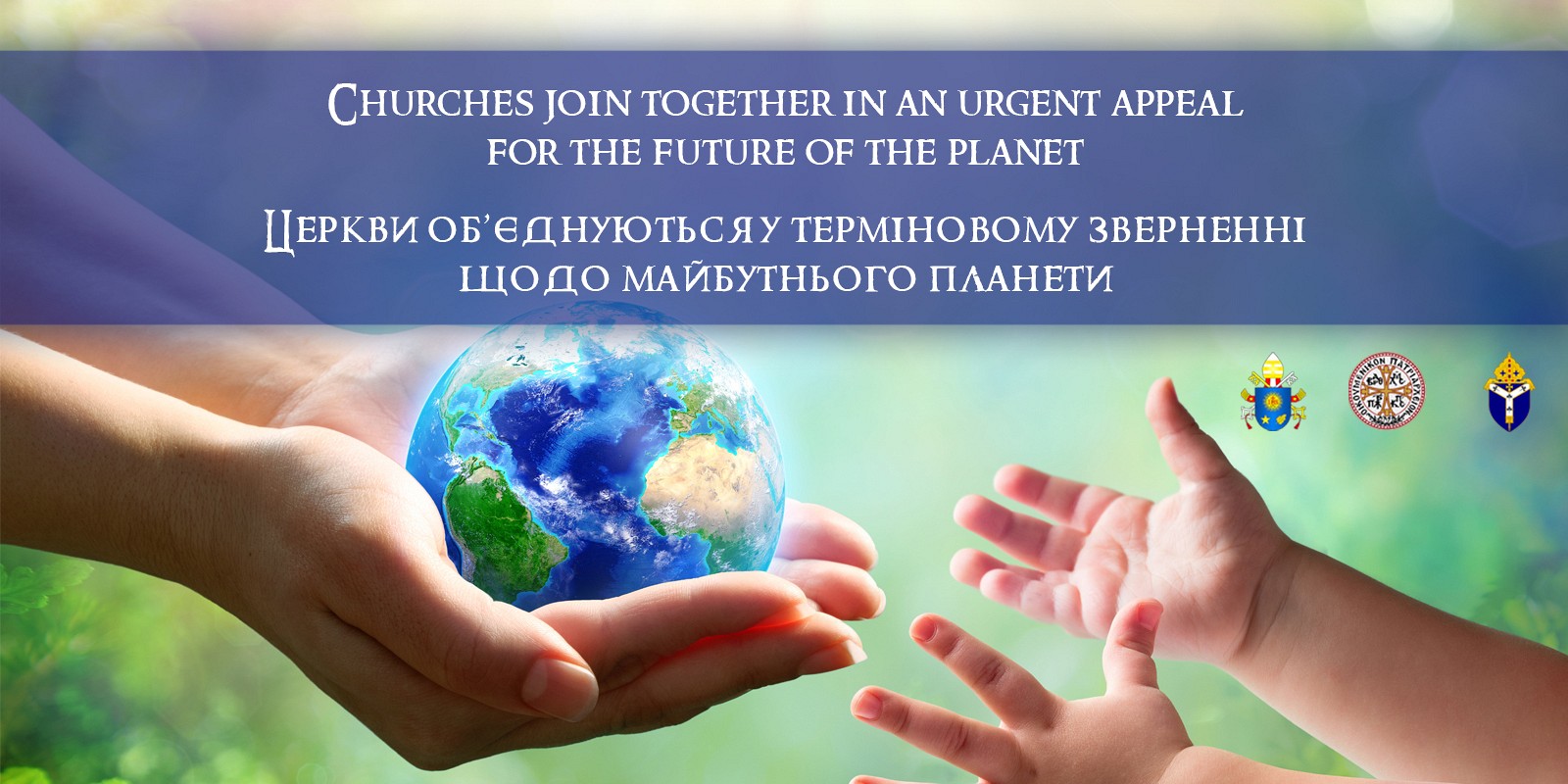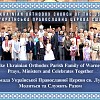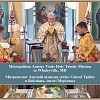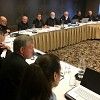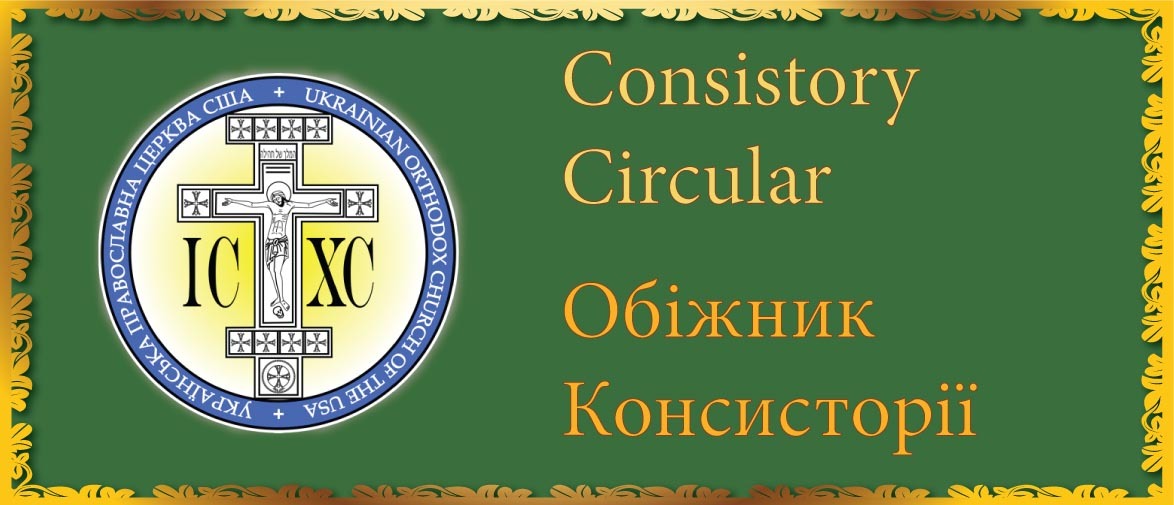Ecumenical Patriarch Bartholomew, Pope Francis and the Archbishop of Canterbury
Join Together for the First Time in Urgent Appeal for the Future of the Planet
For the first time, the leaders of the Roman Catholic Church, the Eastern Orthodox Church and the Anglican Communion have jointly warned of the urgency of environmental sustainability, its impact on poverty, and the importance of global cooperation.
Ecumenical Patriarch Bartholomew, Pope Francis and Archbishop Justin Welby urge everyone to play their part in ‘choosing life’ for the future of the planet.
In a joint statement, the Christian leaders have called on people to pray, in this Christian season of Creation, for world leaders ahead of COP26 this November. The statement reads: ‘We call on everyone, whatever their belief or worldview, to endeavour to listen to the cry of the earth and of people who are poor, examining their behaviour and pledging meaningful sacrifices for the sake of the earth which God has given us.’
The joint declaration strikes a clear warning - ‘Today, we are paying the price…Tomorrow could be worse’ and concludes that: ‘This is a critical moment. Our children’s future and the future of our common home depend on it.’
The three Christian leaders spoke against injustice and inequality, saying: ‘We stand before a harsh justice: biodiversity loss, environmental degradation and climate change are the inevitable consequences of our actions, since we have greedily consumed more of the earth’s resources than the planet can endure. But we also face a profound injustice: the people bearing the most catastrophic consequences of these abuses are the poorest on the planet and have been the least responsible for causing them.’
The statement calls on people to:
- Pray for world leaders ahead of COP26
- For individuals: To make meaningful sacrifices for the sake of the planet, working together and taking responsibility for how we use our resources
- For those with far-reaching responsibilities: To choose people-centred profits and lead the transition to just and sustainable economies
+ + + + + + + + + + + + + + + + + + + + + + + + + + + + + + + + + + + + + + + + +
A JOINT MESSAGE FOR THE PROTECTION OF CREATION
For more than a year, we have all experienced the devastating effects of a global pandemic - all of us, whether poor or wealthy, weak or strong. Some were more protected or vulnerable than others, but the rapidly-spreading infection meant that we have depended on each other in our efforts to stay safe. We realized that, in facing this worldwide calamity, no one is safe until everyone is safe, that our actions really do affect one another, and that what we do today affects what happens tomorrow.
These are not new lessons, but we have had to face them anew. May we not waste this moment. We must decide what kind of world we want to leave to future generations. God mandates: ‘Choose life, so that you and your children might live’ (Dt 30:19). We must choose to live differently; we must choose life.
September is celebrated by many Christians as the Season of Creation, an opportunity to pray and care for God’s creation. As world leaders prepare to meet in November at Glasgow to deliberate on the future of our planet, we pray for them and consider what the choices we must all make. Accordingly, as leaders of our Churches, we call on everyone, whatever their belief or worldview, to endeavor to listen to the cry of the earth and of people who are poor, examining their behavior and pledging meaningful sacrifices for the sake of the earth which God has given us.
The Importance of Sustainability
In our common Christian tradition, the Scriptures and the Saints provide illuminating perspectives for comprehending both the realities of the present and the promise of something larger than what we see in the moment. The concept of stewardship—of individual and collective responsibility for our God-given endowment—presents a vital starting-point for social, economic and environmental sustainability. In the New Testament, we read of the rich and foolish man who stores great wealth of grain while forgetting about his finite end (Lk 12.13–21). We learn of the prodigal son who takes his inheritance early, only to squander it and end up hungry (Lk 15.11–32). We are cautioned against adopting short term and seemingly inexpensive options of building on sand, instead of building on rock for our common home to withstand storms (Mt 7.24–27). These stories invite us to adopt a broader outlook and recognize our place in the extended story of humanity.
But we have taken the opposite direction. We have maximized our own interest at the expense of future generations. By concentrating on our wealth, we find that long-term assets, including the bounty of nature, are depleted for short-term advantage. Technology has unfolded new possibilities for progress but also for accumulating unrestrained wealth, and many of us behave in ways which demonstrate little concern for other people or the limits of the planet. Nature is resilient, yet delicate. We are already witnessing the consequences of our refusal to protect and preserve it (Gn 2.15). Now, in this moment, we have an opportunity to repent, to turn around in resolve, to head in the opposite direction. We must pursue generosity and fairness in the ways that we live, work and use money, instead of selfish gain.
The Impact on People Living with Poverty
The current climate crisis speaks volumes about who we are and how we view and treat God’s creation. We stand before a harsh justice: biodiversity loss, environmental degradation and climate change are the inevitable consequences of our actions, since we have greedily consumed more of the earth’s resources than the planet can endure. But we also face a profound injustice: the people bearing the most catastrophic consequences of these abuses are the poorest on the planet and have been the least responsible for causing them. We serve a God of justice, who delights in creation and creates every person in God’s image, but also hears the cry of people who are poor. Accordingly, there is an innate call within us to respond with anguish when we see such devastating injustice.
Today, we are paying the price. The extreme weather and natural disasters of recent months reveal afresh to us with great force and at great human cost that climate change is not only a future challenge, but an immediate and urgent matter of survival. Widespread floods, fires and droughts threaten entire continents. Sea levels rise, forcing whole communities to relocate; cyclones devastate entire regions, ruining lives and livelihoods. Water has become scarce and food supplies insecure, causing conflict and displacement for millions of people. We have already seen this in places where people rely on small scale agricultural holdings. Today we see it in more industrialized countries where even sophisticated infrastructure cannot completely prevent extraordinary destruction.
Tomorrow could be worse. Today’s children and teenagers will face catastrophic consequences unless we take responsibility now, as ‘fellow workers with God’ (Gn 2.4–7), to sustain our world. We frequently hear from young people who understand that their futures are under threat. For their sake, we must choose to eat, travel, spend, invest and live differently, thinking not only of immediate interest and gains but also of future benefits. We repent of our generation’s sins. We stand alongside our younger sisters and brothers throughout the world in committed prayer and dedicated action for a future which corresponds ever more to the promises of God.
The Imperative of Cooperation
Over the course of the pandemic, we have learned how vulnerable we are. Our social systems frayed, and we found that we cannot control everything. We must acknowledge that the ways we use money and organize our societies have not benefited everyone. We find ourselves weak and anxious, submersed in a series of crises; health, environmental, food, economic and social, which are all deeply interconnected.
These crises present us with a choice. We are in a unique position either to address them with shortsightedness and profiteering or seize this as an opportunity for conversion and transformation. If we think of humanity as a family and work together towards a future based on the common good, we could find ourselves living in a very different world. Together we can share a vision for life where everyone flourishes. Together we can choose to act with love, justice and mercy. Together we can walk towards a fairer and fulfilling society with those who are most vulnerable at the center.
But this involves making changes. Each of us, individually, must take responsibility for the ways we use our resources. This path requires an ever-closer collaboration among all churches in their commitment to care for creation. Together, as communities, churches, cities and nations, we must change route and discover new ways of working together to break down the traditional barriers between peoples, to stop competing for resources and start collaborating.
To those with more far-reaching responsibilities—heading administrations, running companies, employing people or investing funds—we say: choose people-centred profits; make short-term sacrifices to safeguard all our futures; become leaders in the transition to just and sustainable economies. ‘To whom much is given, much is required.’ (Lk 12:48)
This is the first time that the three of us feel compelled to address together the urgency of environmental sustainability, its impact on persistent poverty, and the importance of global cooperation. Together, on behalf of our communities, we appeal to the heart and mind of every Christian, every believer and every person of good will. We pray for our leaders who will gather in Glasgow to decide the future of our planet and its people. Again, we recall Scripture: ‘choose life, so that you and your children may live’ (Dt 30:19). Choosing life means making sacrifices and exercising self-restraint.
All of us—whoever and wherever we are—can play a part in changing our collective response to the unprecedented threat of climate change and environmental degradation.
Caring for God’s creation is a spiritual commission requiring a response of commitment. This is a critical moment. Our children’s future and the future of our common home depend on it.
1st September 2021
Ecumenical Patriarch Bartholomew Pope Francis Archbishop of Canterbury
Вже більше, ніж рік, ми досвідчили на собі руйнівні наслідки глобальної пандемії – усі ми, бідні чи багаті, сильні чи слабкі. Дехто був більш захищеним чи вразливим, ніж інші, але швидке поширення інфекції означало, що ми залежали одні від одних у наших зусиллях, щоб залишатися у безпеці. Ми усвідомили, що перед обличчям цієї всесвітньої катастрофи ніхто не є в безпеці, доки всі не перебуватимуть у безпеці, та що наші дії насправді впливають одні на одних, і те, що ми робимо сьогодні, впливає на те, що станеться завтра.
Це не є новими уроками, але нам прийшлось стикнутися із ними заново. Тож не будемо втрачати цей момент. Ми мусимо вирішити, який світ ми хочемо залишити майбутнім поколінням. Боже доручення є: «Вибирай життя, щоб жити на світі тобі і твоєму потомству» (Вт. 30, 19). Ми повинні вибрати життя.
У вересні місяці багато християн долучаються до ініціативи «Пора створіння», можливості молитись і опікуватись Божим творінням. Зараз, коли світові лідери готуються зустрітись у листопаді у Глазго, щоб обговорити майбутнє нашої планети, ми молимось за них і роздумуємо, який вибір ми повинні усі зробити. Саме тому як лідери наших Церков ми закликаємо кожного, незалежно від їх світосприйняття та віросповідання, прислухатися до голосу плачу Землі та людей, які є бідні, проаналізувати свою поведінку і зобов’язатись трудитись на благо Землі, яку Бог дав нам.
Важливість сталого розвитку
У нашій спільній християнській традиції Святе Писання та святі пропонують нові горизонти для розуміння як реалій теперішнього, так і перспектив чогось більшого, ніж те, що ми бачимо у даний момент. Концепція управління – індивідуальної чи колективної відповідальності за наш Божий дар, представляє життєвоважливу відправну точку для соціальної, економічної та екологічної сталості. У Новому Завіті ми читаємо про багатого і нерозумного чоловіка, що тримає великі запаси зерна, забуваючи про кінець свого життя (Лк.12, 13-21). Ми також знаємо про блудного сина, котрий бере свою спадщину у батька і розтрачає її та зрештою голодує (Лк. 15, 11-32). Нас попереджають про прийняття короткотермінових рішень і, здавалось би, недорогих варіантів будівництва на піску, замість того, щоб будувати на скелі задля нашого спільного дому, який витримає шторми (Мт. 7, 24-27). Ці історії запрошують нас прийняти ширший світогляд і розпізнати наше місце у більш широкій історії людства.
Але ми вибрали протилежний напрямок. Ми максимізували наш власний інтерес за рахунок майбутніх поколінь. Концентруючись на нашому багатстві, ми виявляємо, що довгострокові активи, включаючи щедрість природи, є виснаженими задля короткотермінових переваг. Технології розкрили нові можливості для прогресу, але також і для накопичення необмеженого багатства, і багато з нас поводяться у той спосіб, який демонструє дуже мало турботи про інших людей чи обмеження планети. Природа є витривалою, але дуже делікатною. Ми вже є свідками наслідків нашої відмови від її захисту та збереження (Бт. 2, 15). Саме зараз, у цей момент, ми маємо унікальну можливість покаятися, рішуче повернутися, прямувати у протилежному напрямку. Ми повинні прагнути до щедрості та чесності у способі життя, праці та використанні грошей замість егоїстичної користі.
Вплив на людей, що живуть у бідності
Поточна кліматична криза говорить багато нам про те, хто ми є, як ми дивимось і ставимось до Божого творіння. Ми стоїмо перед обличчям суворого правосуддя: втрата біологічної різноманітності, деградація навколишнього середовища і кліматичні зміни є невід’ємними наслідками наших дій, відколи ми жадібно спожили більше ресурсів землі, аніж планета може виробити. Але ми також зустрічаємось перед глибокою несправедливістю: люди, на долю яких випали найбільш катастрофічні наслідки цих зловживань, є найбіднішими на цій планеті і несуть найменшу відповідальність за їхнє спричинення. Ми служимо Богові справедливості, який радіє у творінні і творить кожну людину на Божу подобу, але також Він чує плач бідних людей. Відповідно, у нас всередині є вроджений заклик відповідати з тугою, коли ми бачимо таку нищівну несправедливість.
Сьогодні ми розплачуємося високою ціною. Екстремальні погодні умови і природні катаклізми останніх місяців з великою силою і великою ціною людських жертв, заново показують нам, що кліматичні зміни є не тільки майбутнім викликом, але є нагальною і невідкладною справою виживання. Екстремальні погодні умови, стихійні лиха, такі як повені, пожежі та посухи загрожують цілим континентам. Підвищення рівня морів, що змушує цілі спільноти до переселення; циклони спустошують цілі регіони, забираючи життя та засоби для існування. Вода стала у дефіциті, а продовольчі запаси небезпечними, що призвело до конфліктів і міграцією мільйонів людей. Ми вже це бачили у тих місцях, де люди покладаються на невеликі сільськогосподарські володіння. Сьогодні ми це спостерігаємо у більш індустріалізованих країнах, де навіть складна інфраструктура не може повністю запобігти надзвичайним руйнаціям.
Завтра може бути гірше. Сучасні діти та підлітки можуть зустрітись із катастрофічними наслідками, якщо ми зараз не візьмемо відповідальності як «співробітники Божі» (Бт. 2, 4-7), щоб підтримати наш світ. Ми чуємо від молодих людей, котрі розуміють, що їхнє майбутнє знаходиться під загрозою. Заради них ми повинні зробити вибір, ми повинні вибрати що їсти, подорожувати, витрачати, інвестувати і жити по-іншому, думаючи не лише про негайний інтерес і вигоди, але також і про майбутню користь. Ми розкаюємось у гріхах нашого покоління. Ми стоїмо поруч наших молодших сестер і братів по всьому світу у відданій молитві та самовіддано трудимося для майбутнього, яке ще більше відповідає обіцянкам Бога.
Заклик до співпраці
За час пандемії ми дізналися, наскільки ми є вразливими. Наші соціальні системи були зруйновані і ми виявили, що ми не спроможні все контролювати. Ми повинні признати, що спосіб, у який ми використовуємо гроші та організовуємо наші спільноти, не приносить користі кожному. Ми відчуваємо себе слабкими і тривожними, зануреними у серію криз: охорони здоров’я, навколишнього середовища, продовольчу, економічну і соціальну, які є всі тісно взаємопов’язаними.
Ці кризи ставлять перед нами вибір. Ми знаходимося в унікальній позиції: або займатися ними із короткозорістю та вигодою для себе або ж для того, щоб використати це як можливість для конверсії та перетворення. Якщо ми будемо думати про людство як про сім’ю і працюватимемо разом у напрямку майбутнього, базуючись на спільному добру, ми можемо опинитися у зовсім іншому світі. Разом ми можемо поділитися баченням життя, де все процвітає. Разом ми можемо вибрати діяти в любові, справедливості та милосерді. Разом ми можемо рухатися до більш справедливого та повноцінного суспільства з тими, хто є найбільш вразливим у центрі.
Але це потребує змін. Кожен із нас окремо повинен взяти відповідальність за те, як ми використовуємо наші ресурси. Цей шлях потребує ще більш тісного співробітництва між всіма Церквами у їх відданості турботі про творіння. Разом як спільноти, Церкви, міста і нації, ми мусимо змінити маршрут і відкрити нові шляхи для спільної праці, щоби зруйнувати традиційні бар’єри між народами, щоб зупинити конкуренцію за ресурси та розпочати співробітництво.
Тим, хто має більш далекосяжні обов’язки – очолити адміністрації, керувати компаніями, наймати людей чи інвестиційні фонди – ми кажемо: обирайте прибутки орієнтовані на людей, йдіть на короткотермінові жертви заради захисту всього нашого майбутнього, ставайте лідерами переходу до справедливих і сталих економік. «Кому багато дається, з того і багато спитають» (Лк. 12, 48).
Це є вперше, коли ми втрьох відчуваємо себе змушеними разом вирішувати нагальну проблему екологічної сталості, її впливом на хронічну бідність і важливість глобального співробітництва. Разом, від імені наших спільнот, ми звертаємось до серця і розуму кожного християнина, кожного віруючого і кожної людини доброї волі. Ми молимось за наших лідерів, котрі зберуться разом у Глазго, щоб вирішити майбутнє нашої планети і її людей. І знову, звертаючись до Святого Писання: «Виберіть життя, щоб і ваші діти змогли жити» (Вт. 30, 19). Вибирати життя – означає йти на жертви і проявляти стриманість.
Всі ми – хто і де б із нас не був – можемо відіграти свою роль у зміні нашої колективної реакції на безпрецедентну загрозу зміни клімату та погіршення стану довкілля.
Опіка над Божим творінням є духовним дорученням, яке вимагає відповіді із зобов’язанням. Це є критичний момент. Майбутнє наших дітей і майбутнє нашого спільного дому залежить від цього.
1 вересня 2021 року
Патріарх Константинопольський Варфоломій
Папа Римський Франциск
Ариєпископ Кентерберійський Джастін Велбі
Переклад Департаменту зовнішніх зв'язків УГКЦ в Україні
|
| |||||||||||||
